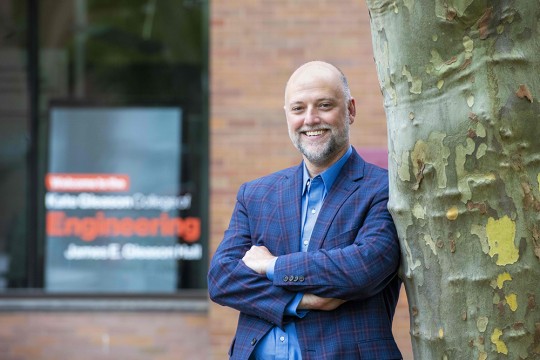
Byron Erath
Department Head
Byron Erath
Department Head
Education
B.S., Brigham Young University; M.S., Ph.D., Purdue University
Bio
Dr. Erath is a Professor, and Department Head of Mechanical Engineering at RIT, and is the director of the Fluid-Acoustic-STructures (FAST) laboratory.
Dr. Erath's research interests encompass the field of fluid mechanics with an emphasis on complex fluid-structure-acoustic interactions. The FAST lab utilizes experimental techniques such as particle image velocimetry, laser Doppler anemometry, high-speed imagery etc. to capture and explore the fundamental fluid dynamics of compelling engineering and personal health problems.
The FAST lab has three main research thrusts:
- Laryngeal aerodynamics of voiced speech production. A more complete undertanding of this nonlinear problem is critical for accurate diagnosis and treatment of vocal pathologies that disrupt the normal speech process.
- Vortex ring impingement on concave cavities. Coherent vortical structures abound in engineering and biological flows. Elucidating the fundamental mechanics that arise when vortex rings interact with solid, concave surfaces provides key insights that inform a variety of flow scenarios; from jellyfish locomotion to replacement speech production to enhanced heat transfer.
- Production and transport of airborne bioaerosols during speech. Airborne transport of infectious diseases remains an existential threat as the physiological parameters that determine the rate of aerosol production, and expiration, during speech remain largely uknown. Elucidating the physics of this interaction is critical for informing and mitigating common behaviors that can influence infection risks.
Select Scholarship
Erath, B. D., Fite, K. B., and Kuxhaus, L. (2024). Catalyzing Clinically Driven Undergraduate Design Projects at the Nexus of Engineering, Medicine, and Business. ASME Journal of Biomechanical Engineering. 146(5), 054701. https://doi.org/10.1115/1.4064717
Rawat, M. S., Agirsoy, M., Senarathna, D., Erath, B. D., Ahmed, T., Mondal, S., & Ferro, A. R. (2023). Comparing Respiratory Aerosol Emissions Between Children and Adults During Sustained Phonation. Aerosol Science and Technology, 57(12), 1186–1204. https://doi.org/10.1080/02786826.2023.2261715
Deng, J. J., Erath, B. D., Zañartu, M., Peterson, S. D. (2023) The Effect of Swelling on Vocal Fold Kinematics and Dynamics. Biomechanics and Modeling in Mechanobiology. 22, 1873–1889. https://doi.org/10.1007/s10237-023-01740-3
Mofakham, A. A., Helenbrook, B. T., Erath, B. D., Ferro, A. R., Ahmed, T., Brown, D. M., Ahmadi, G. (2023) Influence of Two-Dimensional Expiratory Airflow Variations on Respiratory Particle Propagation During Pronunciation of the Fricative [f],
Journal of Aerosol Science. 173,106179. https://doi.org/10.1016/j.jaerosci.2023.106179.
Ahmed T, Erath B. D. (2023) Experimental Study of Vortex Ring Impingement on Concave Hemispherical Cavities. Journal of Fluid Mechanics. 967, A38. https://doi.org/10.1017/jfm.2023.501
Motie-Shirazi, M., Zanartu, M., Peterson, S. D., Mehta, D. D., Hillman, R. E., Erath, B. D. (2023) "Effect of Nodule Size and Stiffness on Phonation Threshold and Collision Pressures in a Synthetic Hemilaryngeal Vocal Fold Model. The Journal of the Acoustical Society of America. 153, 654-664.
Currently Teaching
In the News
-
September 3, 2024

Byron Erath joins RIT as mechanical engineering department head
Faculty-researcher brings expertise in using engineering principles to bio-inspired technology solutions


